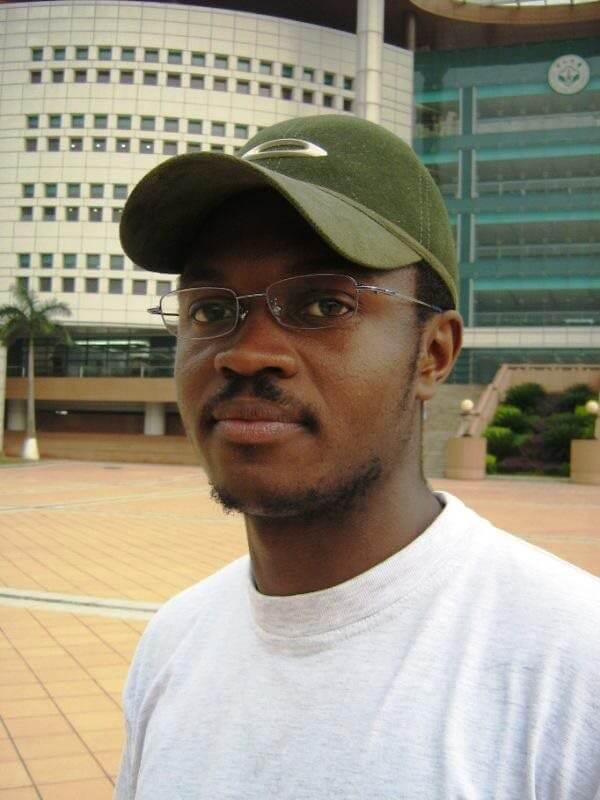This year Cactus Communications celebrates 20 years of supporting researchers on their publication journeys. Starting with our editing service, Editage, CACTUS soon expanded to publication support, pre-submission checks, research impact creation, and other solutions for researchers’, needs beyond publication. To celebrate, we recognize researchers from across the globe who share our vision in supporting and empowering researchers in this interview series.
Please briefly introduce yourself, focusing on your research experience and achievements.
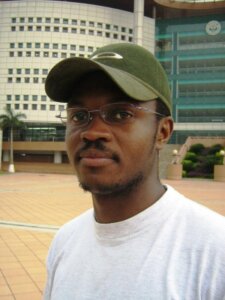
I am an agricultural plant scientist, specializing in global change biology and sustainable agriculture. I was born in Mbouda, Cameroon and currently live in Portugal. I have greatly benefited from excellent professional training, and until now, I have ably grasped an invaluable knowledge in various areas focusing on Cultivation, Biochemistry, Physiology, Pathology, and Molecular biology of plants. I graduated from the University of Yaoundé I (Yaoundé, Cameroon) with a Bachelor’s degree in Food Biochemistry and Technology in 2001, and a Master’s degree in Plant Biochemistry and Pathology in 2005. During my MSc, I investigated the use of bioactive products for controlling late blight disease in Solanaceous crops. My experience then proved useful in obtaining a fellowship for PhD in Crop Science at South China Agricultural University (Guangzhou, P.R. China). After completing PhD in 2010, I was selected as Assistant Professor of Plant Sciences in the University of Bamenda (Bamenda, Cameroon) where I taught for some time before deciding to immigrate to Portugal in my 30s.
My current research broadly focuses on analyzing plant-pathogen-environment interactions and elucidating the role of phytochemicals in the regulation of crop growth, primarily cereals, legumes, and grapevine. The aim of these analyses is to induce resistance to diverse biotic and abiotic stresses, but also to improve the nutritional quality of fruits. I’m specifically interested in (i) physiological and biochemical characterization experiments on crops grown under different management practices and in different climate change scenarios, including elevated carbon dioxide, temperature, ozone, water deficit, heat wave, pests and disease attacks, and (ii) sustainable use of agricultural inputs (pesticides, fertilizers, plant growth regulators, microbial inoculants, and organic amendments
To achieve my research’s goals, I’ve acquired valuable expertise in developing methods for extraction and quantification of pollutants, greenhouse gases and phytochemicals, and methods for the detection of plant pathogens. The expertise has been successfully tested as reflected by 35 peer-reviewed publications between 2008 and 2022 . My work on rice and climate change was of great interest and won an award from the African Academy of Sciences in 2010 and the Elsevier Global Food Security Quiz Award in 2013. My career in science reached a turning point in 2015, when I was awarded funding within the project “VitalityWINE: Fostering viticulture sustainability for Douro valley: multidisciplinary efforts from field to wine” to develop crop-survival strategies in vineyards under different climates. I have since got the opportunity to mentor two MSc students on crops responses to drought and diseases, and to co-mentor a PhD student on intercropping practices.
You have a degree from South China Agricultural University. What is it like to study in this school? What is the biggest takeaway you got from this school?
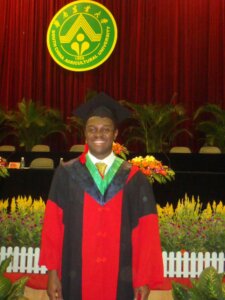
In fact, I have a PhD degree from South China Agricultural University. China was a whole new world for me, given the differences in culture and ideology between the country and Cameroon. I really enjoyed my program at South China Agricultural University and the completion of my research work and PhD graduation was a celebration. I very much enjoyed my college life, as I got along well with the administrative staff, my professors and my classmates. Inside the university, any Chinese students I was acquainted with daily had a very engaging personality. Unfortunately, I experienced firsthand the challenges a black person faces in some Chinese cities while outside the premises of the university.
My biggest takeaway: support for research was exceptional at South China Agricultural University, with no discrimination based on national origin. The university had several research and development centers, often equipped with the latest equipment. Moreover, no limit to advance my research was dictated by the cost, availability, or delivery time of reagents and consumables (which is understandable since a good part of the world’s manufacturing industry takes place in Guangzhou, China). These were necessary conditions for the types of analyses and experiments I envisioned. Thus, I felt good about the research I was able to do.
I used a headspace sampling system to show that several plant growth regulators inhibit the metabolic processes related to the formation of volatile compounds (including volatile organic compounds used as repellents for pests) in rice at the metabolic and gene level. With great input from my supervisor, I established research collaborations with the Thai Center of Excellence for Innovation in Chemistry in Thailand and Centre for Plant Conservation Genetics in Australia and had to opportunity to visit some of these centers to carry out research activities. Moreover, my supervisor always approved my requests to attend international conferences (e.g., in China, Mexico, and Italy) that were essential to the dissemination of our research results and to my development as a scientist. My experience suggested a fairness in the handling of International and Chinese students. I was not subjected to credit or evaluation requirements different from my domestic peers. The PhD courses were in Chinese, and I have attended a one-year Chinese-language training program. And of course, I could rely on the kindness of classmates for help with the language.
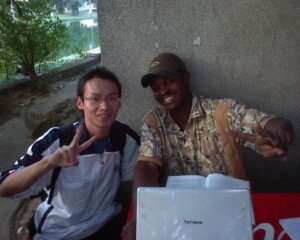 I could also mention a considerable administrative assistance. Before my arrival in China in 2006, I have been constantly hearing about the inefficient and opaque administrative system in the country. For me at South China Agricultural University, it feels the opposite. South China Agricultural University has a long history of training students from developing countries. The training program I attended was supported by both the Department of Student Assistance and Welfare of the Cameroon Ministry of Higher Education and the Chinese Scholarship Council. Thus, the university knew very well what to do with international students once they arrived in the city and on the campus. The university has established a cohesive and energetic international student administration and a residential community to help with integration in the different academic’s departments and to enhance the learning experience of students. However, internationals students studying in English in the university did not share the same views and often complained of lack of administrative support. For some of them, access to information was a major problem. Speaking and understanding the Chinese language created an environment that was clearly beneficial to me.
I could also mention a considerable administrative assistance. Before my arrival in China in 2006, I have been constantly hearing about the inefficient and opaque administrative system in the country. For me at South China Agricultural University, it feels the opposite. South China Agricultural University has a long history of training students from developing countries. The training program I attended was supported by both the Department of Student Assistance and Welfare of the Cameroon Ministry of Higher Education and the Chinese Scholarship Council. Thus, the university knew very well what to do with international students once they arrived in the city and on the campus. The university has established a cohesive and energetic international student administration and a residential community to help with integration in the different academic’s departments and to enhance the learning experience of students. However, internationals students studying in English in the university did not share the same views and often complained of lack of administrative support. For some of them, access to information was a major problem. Speaking and understanding the Chinese language created an environment that was clearly beneficial to me.
After graduation, you started your work in Portugal’s Centre for Research and Technology of Agro-Environmental and Biological Sciences. What extra effort did it take you to get your researcher job in Portugal?
The scientific knowledge and experience I acquired in China were solid enough to broaden my horizon and opened job opportunities in China and out of China. For instance, I was able to mentor four bachelor’s students in China and to define their final dissertation according to the outcomes of the project I was conducting. Such opportunities have not been given to me elsewhere. In fact, my reason for leaving China was not connected to research, but to challenges beyond the workplace. In 2011, I joined the Center for the Research and Technology of Agro-Environmental and Biological Science in Portugal. 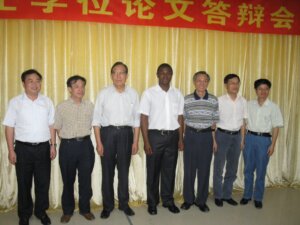
Do you still maintain a scientific dialogue with your Chinese classmates? Have you collaborated on some projects? Are there any interesting experiences of your Sino-Portuguese cooperation?
I found a sense of belonging studying and carrying out research at South China Agricultural University. I am member of the alumni association of the university, and I have kept in touch with my former professors and classmates. Between 2011 and 2018, I successively worked as a postdoctoral fellowin the Laboratory of Agriculture and Environmental and in the Laboratory of Plant Pathology of Center for the Research and Technology of Agro-Environmental and Biological Sciences. Navigating the administrative system is not quite simple and I often need to go through the process of authenticating or certifying my PhD diploma in China for use in Portugal. I always need my former classmates to handle the legalization of documents on my behalf. Moreover, I occasionally need reference letters from my former professors. In 2019, I got recruited as a junior researcher, and could finally set up my own research goals in the laboratory. I decided to elaborate an individual development plan of objectives to reach in the short term (3 years) and midrange term (6 years). A major objective was to establish a research collaboration with my former Chinese university, with the intent of being a “communication bridge” between the Chinese and Europe research systems. My first action was to submit in 2021 a joint proposal to the Horizon Europe call “EU-China international cooperation on nature-based solutions for nutrient management in agriculture”. If accepted, the results of the project will contribute to strengthen international cooperation between China and Europe in the areas of nutrient management in agriculture. With a former classmate, I have accepted in early 2022 an invitation to edit a Research Topic in the journal Frontiers in Agriculture on a comparative analysis of old and new agricultural practices. We are together working on a review paper to the submitted to the Research Topic. Carrying out bilateral exchange programs for master’s students is also being planned.
You have been working as a researcher in Centre for Research and Technology of Agro-Environmental and Biological Sciences for almost 12 years. What did your work include during this period? What experimental and dissertation results have you achieved during this period?
Between 2011 and 2013, I investigated the effects of climate change on crop metabolites, using rice as the model and elevated carbon dioxide and temperature as the causes. In 2011, I was tasked with designing a system for measuring greenhouse gas emissions from paddy fields and studying their impact on rice metabolites. Fieldwork was based at COTARROZ, an agro-food company supported by rice producers, meaning the work had direct practical implications. Early on, I realized that advanced technologies play major roles in enabling discoveries, and therefore, I devoted considerable time to gain knowledge of spectroscopic and chromatographic techniques. To follow CO2, CH4 and N2O fluxes, I used a Trace Gas Analyzer. I became highly involved in understanding changes in the global N cycle using gas chromatography–mass spectrometry. During that time, an unexpected cooperation between my research center and the Julius Kühn-Institut in Germany enabled my exposure to inductively coupled plasma–atomic emission spectroscopy. This formed the basis for the later fruitful use of Skalar San+ for detecting four phosphorus forms at the host center. I also developed a research relationship with the Faculty of Pharmacy of Universidade do Porto. A major skill I gained there was the use of liquid chromatography–mass spectrometry. The technique became indispensable to me in studying antioxidant compounds, sugars, amino acids, and organic acids. During that period, I developed a full profile of the effects of CO2 and temperature on the nutritive value of rice grains. The results showed that changes noted under CO2 will generally be prominent under CO2 + temperature and offer definitive answers regarding the behavior of the main Portuguese rice cultivar, Ariete. I proved that the protein competition rather than the growth-differentiation balance model explains the response of phenolic compounds to elevated CO2. The hypothesis that carbon allocation to phenolic synthesis under CO2 depends on ontogenetic plant development could be tested, with the implication of limited prospect for genetic modifications. I belonged to the team that determined seasonal CH4 and N2O emission factors for Portuguese paddy fields. These factors are included in National Inventories, and have contributed to 10% reduction in national emissions, according to recent calculations.
Between 2014 and 2016, I continued investigations on the effects of climate change on crop metabolites, using cowpea as the model and drought and phosphorus deficiency as the causes. The work was conducted as part of a project funded by the European Commission 7th Framework Programme for Research and Technical Development (FP7). Thus,a major part of the work involved interaction with FP7-hired scientists. Despite meetings and discussions, we were unable to devise means to connect our research. Undeterred, I audaciously shifted to the omics field, and to places with a more stimulating atmosphere. My supervisors granted me freedom to pursue my interests, and between 2015 and 2016, I was accepted as a visiting researcher at the Plant Metabolomics Laboratory of the Institute of Chemical and Biological Technology António Xavier in Lisbon. Since then, I have successfully used mass spectrometry-based metabolomics to study cowpea under different water and phosphorus levels. Additional knowledge of the use of pressure bombs and thermocouple psychrometers for analyzing water relations in plants was gained there. I contributed to the hypothesis that drought tolerance may be conferred by engineering plant stress responses via metabolite-based markers. I observed that upon exposure to water deficit, cowpea reprograms the shikimate and arginine/proline pathways, producing quercetin 3-O-6”-malonylglycoside. These years were punctuated by various courses in metabolomics, transcriptomics, proteomics, and breeding, shifting my research more on plant biotechnology.
Between 2017 and 2021, I became devoted to (i) understanding how alterations in biomolecules, metabolic pathways, and protein expression events contribute to the tolerance of grapevine to diseases and pests, and (ii) finding ways for a sustainable protection of plants against pests and diseases in an integrated production system. The aim of the work is getting a better understanding of the interactions between plants, pathogens, pests and the environment at the gene, protein and molecule levels, with the aim of selecting and breeding tolerant crops, and developing biological control agents with antagonistic microorganisms. Because of the facilities available, my interests during the last 4 years have increasingly been oriented towards lipidomics and proteomics. Additional knowledge of the use of microscopy, serological (e.g., ELISA), molecular hybridization (e.g., WESTERN blotting), DNA amplification (e.g., PCR – polymerase chain reaction), sequencing techniques (e.g., Sanger sequencing), and spectroscopic techniques (e.g., NMR) for the diagnosis of plant pathogens was gained. These analyses have led to the identification of a group of lipids that could be used as diagnosis markers for predicting the onset of grapevine trunk diseases.
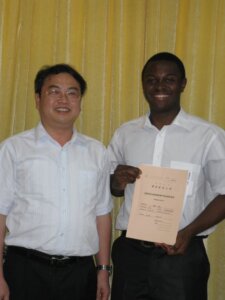
Which of your dissertation results are you most proud of? Can you recall its production process and academic impact?
I am equally proud of two publications. The first publication is Goufo, P., Trindade, H. (2014). Rice antioxidants: phenolic acids, flavonoids, anthocyanins, proanthocyanidins, tocopherols, tocotrienols, γ-oryzanol, and phytic acid. Food Science & Nutrition 2, 75–104 . In late 2011, my postdoctoral superior encouraged me to write a review paper. For the review, I built a food composition database of rice antioxidants, enabling easier selection of biomarkers of antioxidant intake. I wrote the manuscript with the intermittent help of my supervisor during a span of two years. The manuscript was submitted to the journal Food Science & Nutrition on October 2, 2013. The review process was quite fast since we received a decision on November 12, 2013, with a request for minor revisions. The database was timely, and is widely used by the scientific community, as reflected by nearly 550 citations on Google Scholar Citations. The work also contributed to a better understanding of the effects of elevated CO2 and temperature on rice. Although small, that input has advanced the field.
The second publication is Goufo, P., Moutinho-Pereira, J., Jorge, T.F., Correia, C.M., Oliveira, M.R., Rosa, E.A.S., Antonio, C., Trindade, H. (2017). Cowpea (Vigna unguiculata L. Walp.) Metabolomics: Osmoprotection as a physiological strategy for drought stress resistance and improved yield. Frontiers in Plant Science 8, 586 . The publication reports the identification of a metabolite marker for drought adaptation in cowpea, thus far my proudest scientific achievement. I put in the hours and efforts needed to make the paper a major contribution to the field, considering prior publications. The manuscript was the culmination of four years of hard work. The work was not only in the design of the experiment and in the field and laboratory activities, but also in the statistical analyses and the visual presentation of data, and in the language necessary to transmit a strong message. Indeed, the manuscript went through the Scientific Editing Service of Editage to ensure everything was the best quality possible.
On October 16, 2016, we sent the manuscript to Journal of Experimental Botany. Despite positive reviews received a month later, the handling editor decided to reject the paper on the basis that “The paper does not provide sufficient new developments”. We tried the journal Scientific Report on November 14, 2016. The paper got rejected on February 20, 2017. The first review despite being very detailed, was really positive and stated that the study has made an important contribution to the field. The second review was totally unsound and consisted of three sentences in a very poor English, ending with the comment “Basically, any conclusion based on this study is meaningless”. All the three sentences were about “what should have been done” and not “what was done”. The handling editor sided with the second reviewer and stated that “The paper has no scientific merit”. The comments from the reviewer and the handling editor were atrocious and hurtful, especially from Scientific Report, a new journal that swore to “adhere to a fair and unbiased review process”.
I remembered listening to a researcher that described a particularly brutal rejection he received with the comment “This paper can be of no interest to anyone”. Ten years after publishing my first paper, it was the first time I got a comment as awful and devastating as this one. I have had dozens of manuscripts rejected before, but I always understood the criticisms. With my confidence completely sunk, I started thinking about leaving academia. In fact, I stopped going to the laboratory for a week until my supervisor called me, encouraged me not to give up, and asked to appeal against the decision, which I did. We received a very compassionate reply from the managing editor of Scientific Report, who suggested to resubmit with a point-by-point rebuttal to reviewers’ comments. We decided to submit to Frontiers in Plant Science on February 16, 2017. The manuscript was edited by a world-leading expert in the field of climate change and accepted within a month. It is my most highly cited research paper so far with over 100 citations according to Google Scholar Citations. Several researchers worldwide after reading the paper, have come up to me asking for help with their own analyses or in designing their own experiments.
In your process of scientific research for years, what do you think is the most important thing to do when you are working on an essay?
To avoid unwarranted rejections, the most important thing is to tell a compelling and complete story, whether there is something new or not being reported. In my experience, it has become increasingly difficult to publish scientific papers despite the advent of the open-access movement. One reason is that reviewers and editors are snowed under with a lot of submissions and spend less time thoroughly reviewing a manuscript. Another reason is that there is more resistance out there from peers as attested by social media posts, and for many reviewers, the scientific content of the paper is not of paramount importance anymore.
The purpose of a scientific paper is to convey information. A compelling paper is one that clearly communicates the science with evidence-based conclusions and is a pleasure to read. A complete paper is one with a logical clear structure and a key message throughout the sections i.e., getting to the point (significance and originality of the work), showing an understanding of the existing literature (problems and proposed solutions), providing a detailed description of methods, avoiding long and speculative arguments. If there are pages or word count limits, I always consider providing a full description of methods as supplementary material. When writing a paper, I also picture the editor, the reviewer, and the reader as busy and tired people.
What is your typical working day like?
The typical work activities vary from day to day, but with a common structure. I am a Research Scientist with 70% of my time allocated to research and 30% to teaching. Owing to continued funding since 2011, my research was not interrupted, which means that I have spent every single day working until starting a family in 2018. My day usually starts off at 6:00 AM with getting a cup of tea and opening my laptop. I am member of the editorial board of two scientific journals and dedicate my early morning to making editorial decisions. It is also a good time to grade students’ works with a very fresh mind. Mornings between 8:00 AM and 9:00 AM are especially busy, getting the kids ready for school and preschool drop-off. When I turn on my desktop around 9.30 AM in the office (I share the office with another colleague), the first thing is to go through my emails and letters and review a to-do list for the day (upcoming classes, appointments, conferences, and meetings). My department and project meetings usually take up a large portion of my day, especially now with COVID-19 restrictions and the easiness of setting up an online meeting. Managing budgets and requesting the purchase of reagents, consumables and equipment is also done in the morning.
A normal day includes planning experiments. In fact, a large part of my job entails strategic thinking and formulating innovative hypotheses. Then comes the execution of the experiments. I have not carried out laboratory work during the last three years; instead, I have been mentoring students and teaching them how to use the various equipment in the laboratory. I often walk over to the lab at around 11:00 AM to see what the students are doing and assess their progress. On the other hand, I really enjoy field work and always make sure to be involved in activities conducted in the experimental farm of the research center or in partners’ farms.
After catching something to eat at around 1:00 PM and another cup of tea, whether at work or home, I go for a 30 min walk around the campus or in the city if the weather is fine; an old habit from China. I have given up trying to socialize and connect with my co-workers in the outside of day-to-day duties. I am the least energized immediately after lunch and avoid activities involving reading and writing. Instead, I would analyze data, prepare tables and figures and see how to set up international research collaborations. Reading publications, writing reports, articles, conference abstracts, and grants usually follows. I read and write with my headphone on listening to Cameroonian jazz or religious music. It is common to work more 12 hours per day including weekends and holidays when preparing a grant application. In the last years, research funding has gradually decreased, and consequently, getting a grant is currently a nightmare in academia. The evening between 6:00 PM and 9:00 PM is usually devoted to family activities. After making sure that the kids are sleeping, and with a third cup of tea, I usually check my emails and answer the most pressing ones. It is also the time to stay up to date on the international news, usually from cable news, the New York Times, Daily Wire, Cameroon-info.net, and the Africa Report, before going to bed.
I depend on weekends to review manuscripts, with a strict rule “no more than two peer-reviews per month on average”. Unlike published papers that I read on-screen, I usually print out manuscripts to be peer-reviewed at home or during a walk in the park. It is also during the weekend that I review students’ dissertations and thesis. The working day structure described above might seem rigid, but it is not. Science never fits neatly into a schedule, and the working system in Portugal is even more unpredictable. Some days are more suited for one activity than the other, several activities are interrupted by students, and there are several urgent deadlines and administrative hurdles in my research center. In fact, I do not have a direct control of my schedule because of the bureaucracy. To avoid burnout, flexibility is paramount.
Currently, I have a much better work/life balance than five years ago, because I have learned to rapidly pivot and adapt to new situations, and to avoid unnecessary meetings. I have decided to delegate some tasks such as language polishing or statistical analyses to professional editors. I do know that starting a family has put me at a competitive disadvantage for jobs and promotions. Well, that’s life.
What research projects are you currently working on? What are your future research plans?
I have recently been awarded a project grant to study means for enhancing the quality of soils. It is the first project I am involved in that focusses on finding the most efficient ways to minimize the use of synthetic chemicals in agriculture. The past 10 years (2011-2021) have been a mix of challenging, and frustrating experiences in my research journey, given that it always took a great amount of effort and time to generate a single paper in the field of global change biology and diseases. Since 2021, I have progressively discovered that research on new agricultural methods for enhancing sustainable crop production was an interesting area to advance my career as an Agricultural plant Scientist. The need for scientific independence in my continuous efforts in hypothesis-driven research is evident. I believe that a deeper focus on sustainable agricultural practices provides a chance for me to achieve this independence, and to acquire the versatility needed to reach my full potential as an agricultural researcher. In the near future, I am dedicated to take concrete steps to attracting more research fundings in the area and to contribute to a reduction of pollution from agriculture using management practices based on concepts such as climate-smart agriculture, diversified farming, sustainable intensification, circular agriculture, regenerative agriculture, and organic agriculture. The outcomes are to limit the use of agricultural chemicals through improving the properties of soils and boosting the intrinsic tolerance or resistance capacity of plants against pests and diseases (e.g., with organic amendments and beneficial microorganisms).
Where do you see yourself in 20 years?
Within the next two decades, I intend to start my own farm while breaking into consulting. i.e., creating something and selling it. Farming as a business has always fascinated me. I believe my penchant for it stems from the fact that I grew up in a family farm in the main crop-producing area in Cameroon. Despite a rapidly growing research profile, I have recently started exploring the full range of job opportunities in the agro-industrial sector, both home in Cameroon and internationally. Center for the Research and Technology of Agro-Environmental and Biological Sciences is an applied research unit, whose strategic project focuses on sustainability and innovation in Agrifood chains in a changing environment for a competitive bioeconomy. However, the R&D department do much more Research than Development. My work so far in the research center has been to broaden scientific understanding in general. Indeed, academic research looks at assumptions that may take years to verify. Industry research seems to put reality and the end-user into consideration with the aim of translating foreground knowledge from research language into practical application. Another strong motivation for considering moving out of academia is that teamwork seems to be a core value in the industry whereas academia mainly looks at individual achievements. As an academic researcher in Europe, being accepted in a team and building workplace relationships across ethnic boundaries has always been very difficult, which made my work harder and less satisfying. My previous interactions with some farming companies have led to understand that in the industry sector, being part of the team is not an option. I have already formed several strategic partnerships within the farming industry. This has provided me with the chance to learn the business logic and to understand that my research skills and expertise provide an ideal basis for farm industry engagement. Acquiring and building a multidisciplinary approach has also prepared me to tackle various issues related to global and agricultural development issues. I have already gained experience in international consulting, providing scientific expertise to farmers’ organizations, and formulating guidelines for minimizing greenhouse gas emissions. Managing my own farm forms a great opportunity to facilitate consulting work.
A version of this interview was first published on the Editage China WeChat account. Advance your research journey through the Researcher.Life Ambassador Program – apply today!
